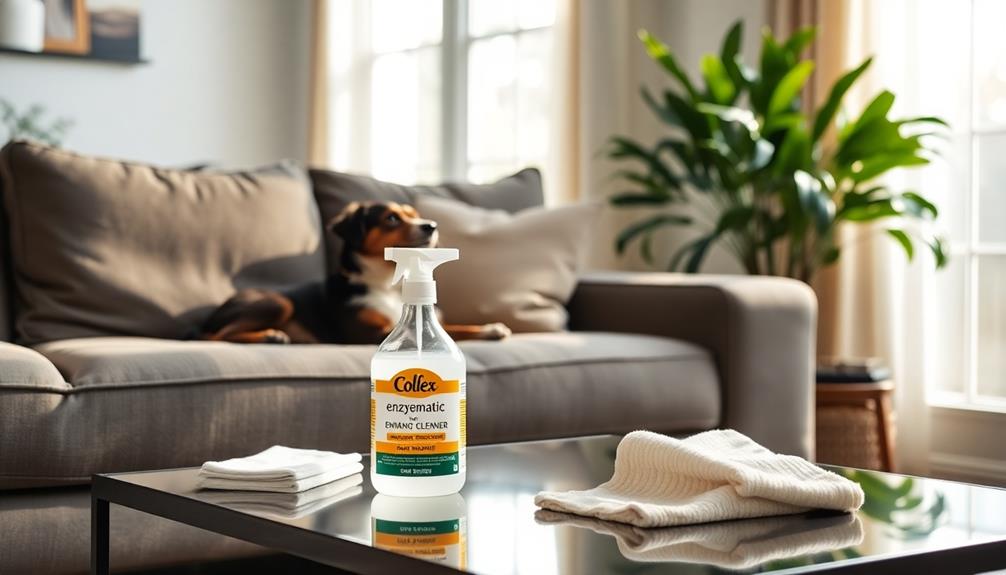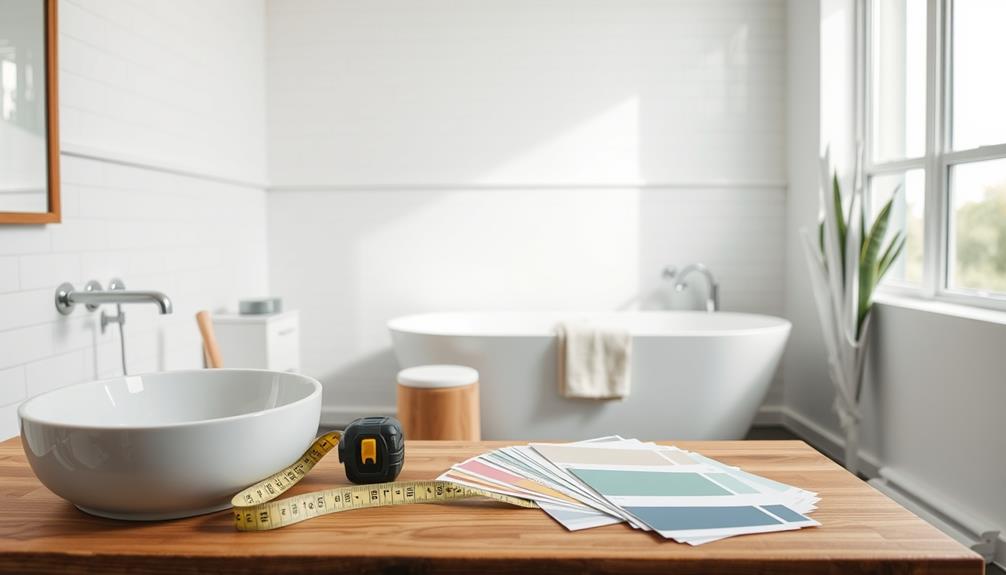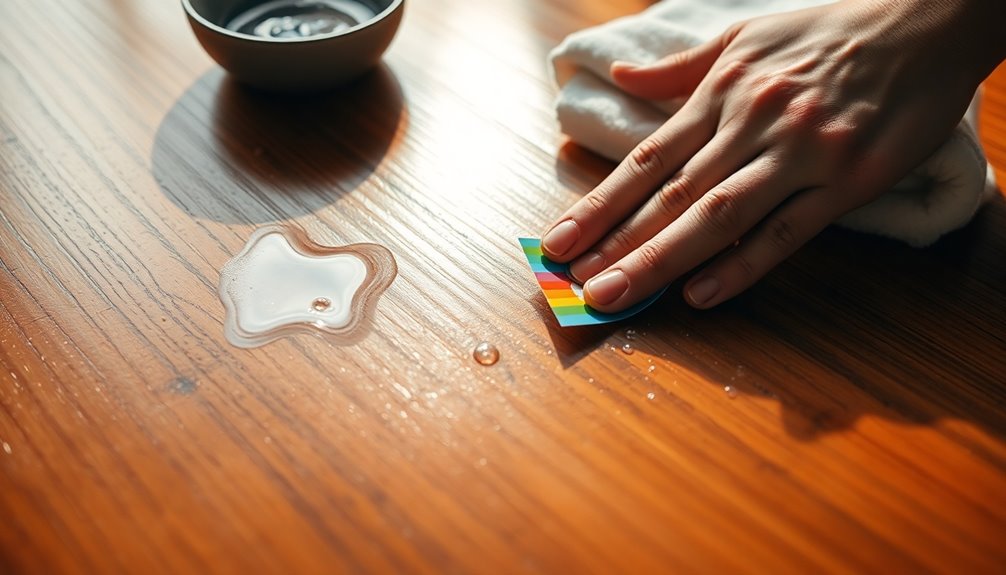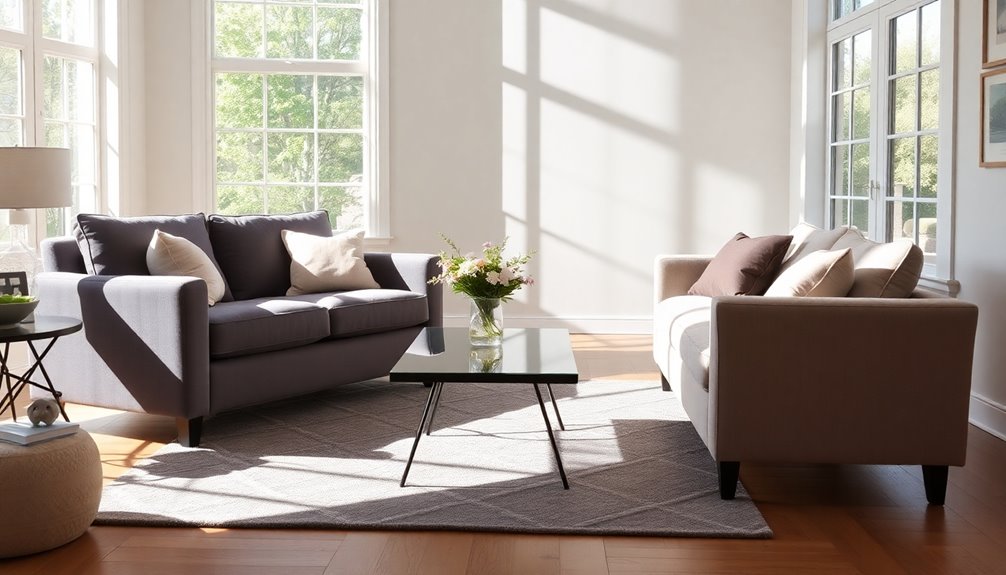In order to eliminate the odor of dog glands that lingers on your furniture, it is recommended to use an enzymatic cleaner such as Nature’s Miracle to address the smell directly. Start by soaking the affected area and then blotting up any excess moisture with clean towels. Another option is to mix equal parts of white vinegar and water in a spray bottle and spray it on the area with the smell. For a quick solution, pet cleaning wipes are effective at immediately neutralizing odors. Additionally, consider sprinkling baking soda on the affected area, allowing it to sit, and then vacuuming it up. It is important to keep your dog clean and groomed to prevent odors. Regularly washing your pet’s bedding can also help in preventing odors from transferring to furniture. Regular grooming is also crucial in reducing odors and shedding. Additionally, removing cat hair from couch surfaces can help freshen up your living space, as hair and dander tend to trap odors.
Key Takeaways
- Use enzymatic cleaners like Nature's Miracle to effectively break down and eliminate dog gland odors from furniture.
- Mix equal parts white vinegar and water to spray on affected areas for natural deodorization.
- Sprinkle baking soda on the area, let it sit to absorb odors, and vacuum afterward for freshness.
- Maintain a clean environment by regularly washing pet bedding and using pet cleaning wipes for quick clean-ups.
- Consult your vet for advice on managing anal gland health to prevent future odors.
Understanding Dog Gland Smells
Dog gland smells can be an unpleasant surprise when they transfer from your pet to your furniture. Your dog's anal glands produce a strong-smelling fluid that's usually released during defecation.
However, if these glands become impacted or infected, they can lead to a lingering odor that clings to your couches and carpets. You might notice your dog engaging in excessive licking or scooting, which are signs of discomfort and potential anal gland issues.
To help with overall pet health, consider using essential oils with antimicrobial properties that can assist in preventing infections and maintaining a cleaner environment.
To combat this, maintaining regular firm stool is vital. A balanced diet rich in fiber supports healthy anal gland function, reducing the likelihood of odor-related problems.
When odors do occur, effective cleaning is essential. Enzymatic cleaners work wonders by breaking down the compounds responsible for the unpleasant smell. Soaking and blotting can help remove lingering odors from surfaces as well.
Essential Cleaning Supplies
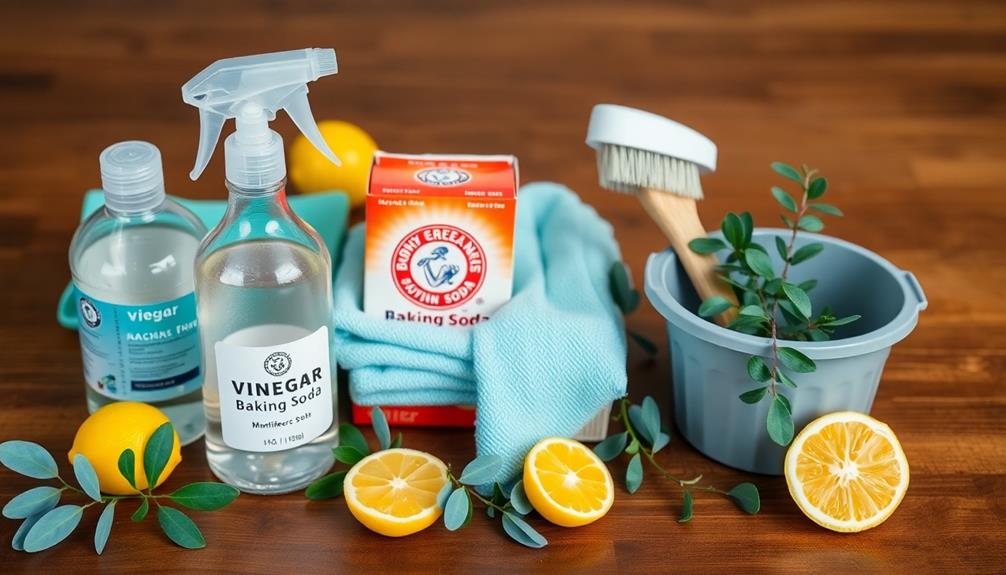
To tackle the lingering odor from your dog's anal glands, having the right cleaning supplies on hand makes all the difference.
Start with enzymatic pet stain and odor eliminators like Nature's Miracle or Simple Solution Extreme. These products effectively break down anal gland odors on your furniture surfaces. Enzymatic pet stain and odor eliminators like Nature’s Miracle or Simple Solution Extreme are designed to neutralize even the toughest odors, including those from anal glands. They work by breaking down organic matter, leaving your furniture surfaces fresh and clean. When using these products, remember to always follow the instructions, especially when moving furniture safely in danger of tipping or causing injury during the cleaning process.
For quick clean-ups, pet cleaning wipes are essential; they allow you to manage immediate messes on both furniture and your dog's fur. Additionally, providing your dog with healthy snacks can promote overall wellness, potentially reducing the frequency of anal gland issues.
If you need to do some spot cleaning, regular dish soap can work, but make sure to rinse thoroughly with hot water to avoid residue buildup. A high-quality dog shampoo specifically designed for odor elimination is also necessary, especially if the smell is embedded in upholstery.
While human deodorant might temporarily mask odors when applied gently on a cloth, use this option cautiously to prevent skin irritation for your pet.
Having these supplies ready guarantees you can quickly address any odor issues and keep your home smelling fresh. With the right tools, you'll be well-equipped to combat those persistent anal gland odors effectively.
Immediate Cleaning Techniques
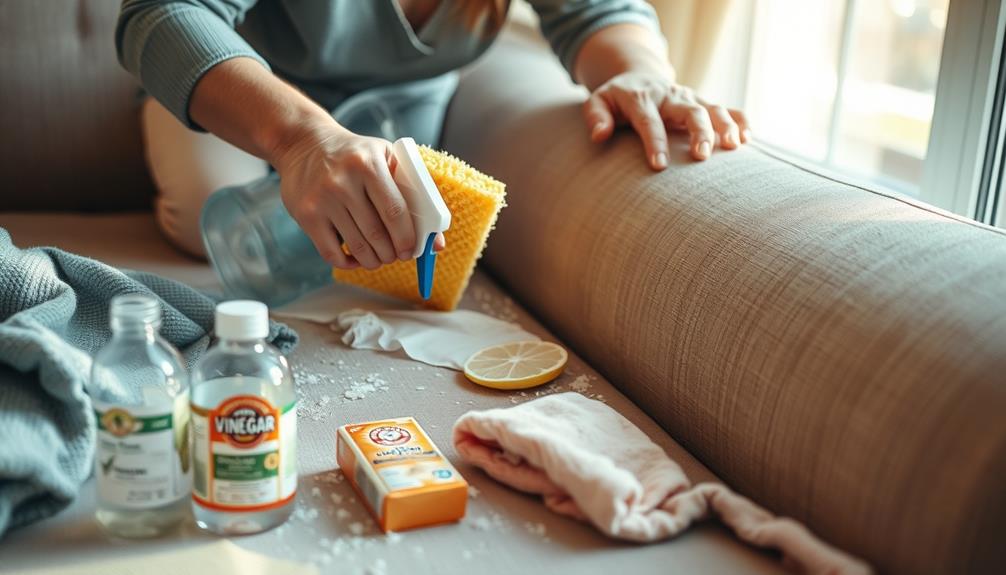
Dealing with the unpleasant smell from your dog's anal glands requires prompt action to prevent the odor from settling in. Start by soaking the affected area with an enzymatic cleaner like Nature's Miracle. This cleaner breaks down the substances causing the dog anal gland smell, so let it sit for the recommended time before blotting with clean towels.
For maintaining a fresh environment, consider using an air purifier to help reduce any lingering odors in the room, as air quality considerations are important for overall freshness. For a quick fix, grab some pet cleaning wipes and apply them directly to the soiled area. They work well to neutralize odors instantly.
If the smell still lingers, mix equal parts of white vinegar and water in a spray bottle. Spray the area and let it dry, as vinegar effectively neutralizes strong odors. After it dries, blot up any excess.
For persistent smells, sprinkle baking soda on the affected area and let it sit for several hours to absorb odors. Once done, vacuum it up.
Deep Cleaning Methods
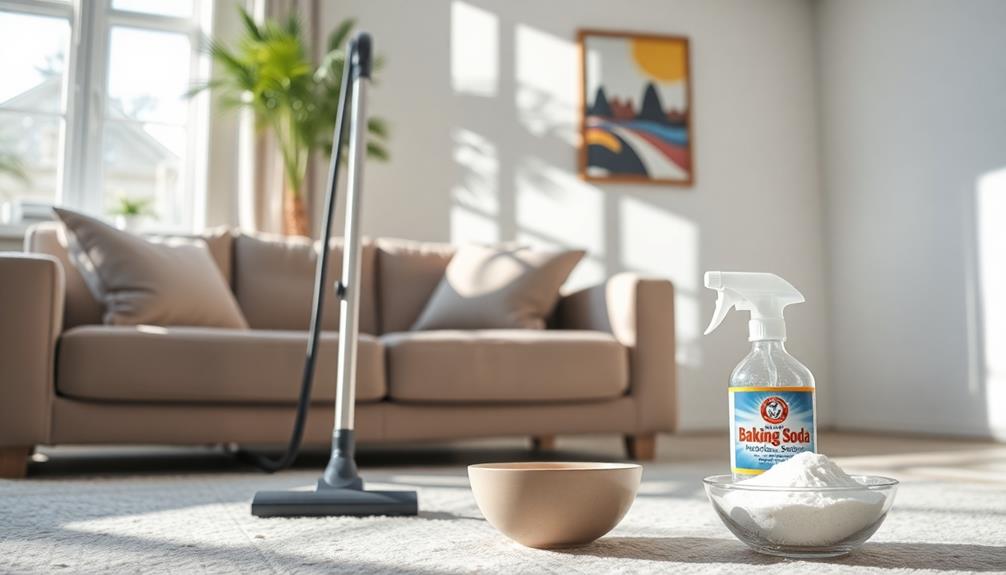
How can you effectively eliminate stubborn dog gland odors from your furniture? Start by using an enzymatic cleaner like Nature's Miracle. Thoroughly soak the affected area, allowing the cleaner to penetrate the fabric for ideal odor breakdown.
After you soak, blot the excess moisture with clean towels to help the area dry faster. To speed up the drying process, consider using fans; remember that it can take up to two weeks for the fabric to fully air dry.
For a natural deodorizer, mix equal parts white vinegar and water, then apply it to the affected areas. Let it air dry to neutralize the odors effectively.
If the smell persists, you might want to hire a professional cleaning service. They can provide steam cleaning and specialized treatments designed to eliminate deep-set pet odors.
Another effective method involves sprinkling baking soda over the affected area. Let it sit for several hours to absorb the odors, then vacuum it up for a fresher smell.
Preventive Measures for Odor Control
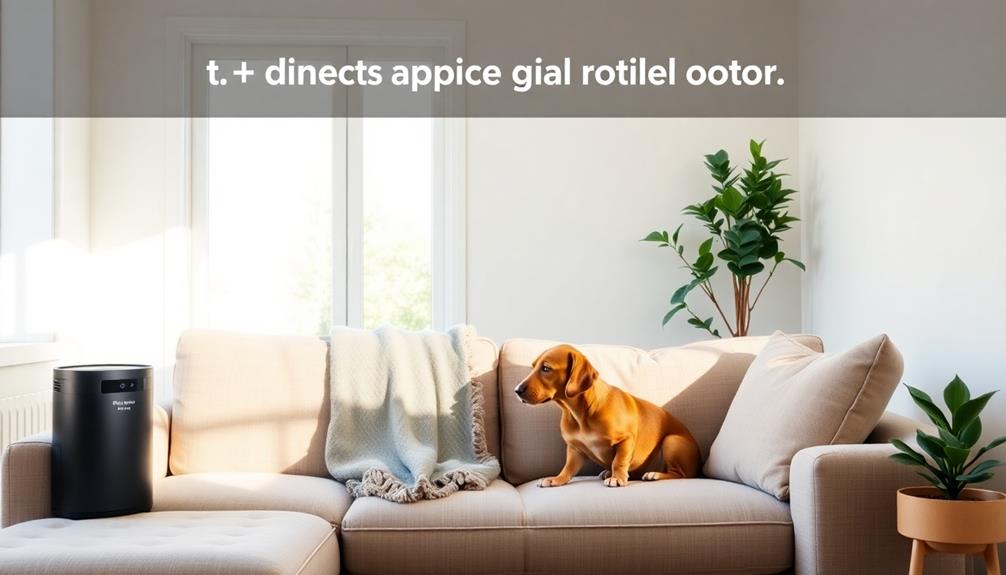
To keep odors at bay, focus on your dog's diet and grooming routine.
Feeding your pup a high-fiber diet helps maintain firm stools, which can reduce anal gland issues.
Regular grooming and exercise not only keep your dog clean but also promote overall health, minimizing any potential smells on your furniture.
Dietary Adjustments for Firmness
Maintaining a dog's dietary balance is vital for preventing unpleasant odors linked to anal gland issues. One effective strategy is incorporating high-fiber foods, like canned pumpkin or green beans, into your dog's diet. These foods promote firm stool consistency, reducing the chance of anal gland problems and the associated smells.
Additionally, consider a diet rich in novel protein sources, which can help identify allergens that might be causing issues. Avoiding grain in dog food can also improve digestion and minimize soft stools, further preventing anal gland blockages.
Regular vet consultation about dietary adjustments guarantees your dog receives ideal nutrition, supporting healthy anal gland function. Don't overlook proper hydration; it's essential for digestion and helps maintain anal gland health, contributing greatly to odor prevention.
Regular Grooming and Exercise
Regular grooming and exercise are key components in managing dog odor, particularly those related to anal gland issues. By committing to regular grooming, you can easily remove loose fur and debris that trap odors. Additionally, close inspection of your dog's anal area during grooming can help you catch any potential problems early.
Exercise plays an essential role, too. Consistent physical activity promotes healthy digestion and regular bowel movements, naturally helping to express your dog's anal glands. This reduces the likelihood of odor buildup.
Bathing your dog with quality shampoo every 4-6 weeks also helps eliminate lingering odors, especially around the anal area.
Incorporating high-fiber foods into your dog's diet is another effective strategy. These foods support firm stool formation, aiding in the natural expression of anal glands and minimizing odors.
Finally, maintaining a clean living environment is fundamental. Regularly wash your pet's bedding and consider using slipcovers on your furniture to prevent the accumulation of odors.
Signs of Anal Gland Issues

Noticing signs of anal gland issues in your dog can help you address potential health problems early. If you observe any unusual behaviors, it's important to pay attention.
Here are some common signs to look out for:
- Excessive scooting or dragging the rear end on the floor, indicating discomfort.
- Licking or biting at the anal region, suggesting inflammation or pain.
- Noticeable foul odors coming from your dog's rear, which may signal blocked or infected anal glands.
- Straining during defecation or difficulty passing stool, possibly indicating impacted anal glands.
- Redness and swelling or any discharge around the anal area, which could point to infection or other serious conditions.
These symptoms can help you identify potential anal gland issues before they worsen.
If you notice one or more of these signs, it's important to monitor your dog closely. Early intervention can prevent more severe health problems and improve your dog's overall well-being.
Keeping an eye on these indicators can guarantee your furry friend stays happy and healthy.
Seeking Professional Assistance
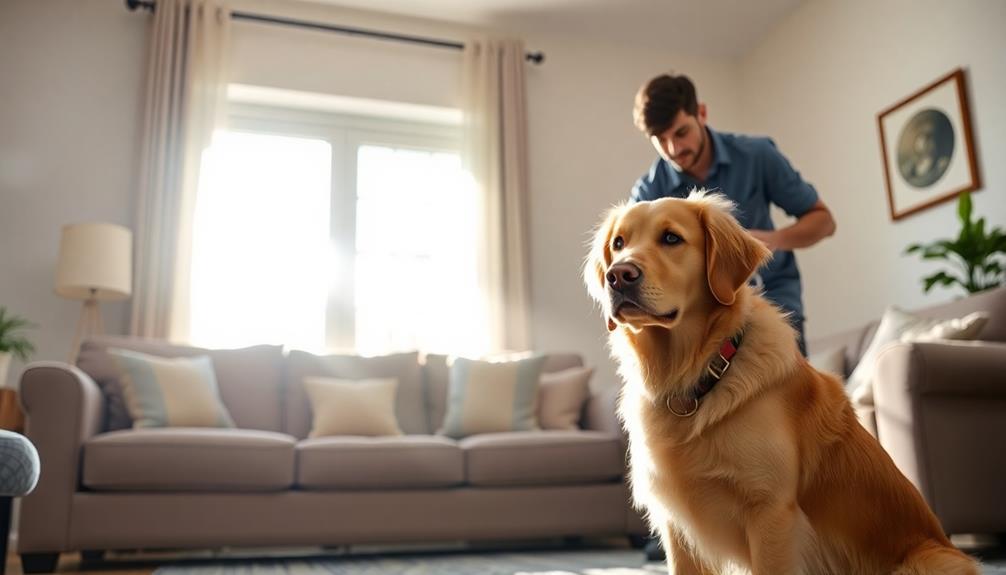
If you're struggling to eliminate that stubborn odor, it's time to seek professional help.
A vet can provide valuable insights into your dog's anal gland issues, while grooming services can address the source of the smell.
Additionally, online veterinary options offer convenient consultations to discuss ongoing problems and preventive measures.
Vet Consultation Importance
Consulting a veterinarian is essential for your dog's health and can greatly reduce unpleasant odors from anal glands.
Regular vet consultations help identify underlying health issues related to anal gland function, preventing recurring odors on your furniture. If your dog experiences chronic issues, a vet can provide professional anal gland expression, alleviating the odor at its source.
Here are some key benefits of seeking veterinary advice:
- Early intervention prevents serious conditions like infections or abscesses.
- Discussing diet can lead to recommendations for high-fiber foods that promote healthy anal gland function.
- Regular check-ups help monitor overall health and detect changes in behavior.
- A vet can guide you on the best practices for maintaining your dog's hygiene.
- They can diagnose and treat any anal gland problems effectively.
Grooming Services Benefits
When you choose professional grooming services for your dog, you're not just ensuring a tidy appearance; you're also addressing potential health issues related to anal glands. Regular grooming appointments can greatly enhance your pet's hygiene, allowing for early detection of anal gland problems before they escalate.
Groomers are trained to express anal glands safely, preventing buildup and the unpleasant odors that often accompany it. Many grooming facilities offer deodorizing treatments specifically designed to eliminate pet odor linked to anal glands. These treatments can keep your home smelling fresh and reduce the likelihood of odors returning.
Additionally, groomers have specialized tools and techniques to handle anal gland issues, minimizing any risk of discomfort or injury for your dog. Beyond just cleaning, grooming services often provide valuable advice on proper diet and care strategies to help you manage your dog's anal gland health more effectively.
Online Veterinary Options
Professional grooming services can greatly improve your dog's hygiene, but sometimes you need more specialized advice. That's where online veterinary options come in handy. With platforms like PangoVet, you can consult with professionals from the comfort of your home.
These services are perfect for pet owners dealing with anal gland issues and the associated odors.
Here are some benefits of using online veterinary consultations:
- Quick assessment of your dog's symptoms
- Tailored recommendations for dietary adjustments
- Effective home care strategies to manage odors
- Insights on grooming techniques to prevent recurring problems
- Guidance on when to seek in-person veterinary care
Virtual vet consultations can help you address your dog's anal gland concerns before they escalate. By using these services, you'll receive expert advice on odor management, ensuring your furry friend stays fresh and healthy.
Additionally, you can learn useful grooming techniques and suitable products that can mitigate odors effectively between vet visits. Embracing these online veterinary options can lead to early intervention, helping you maintain a cleaner home and a happier pet.
Community Tips and Experiences
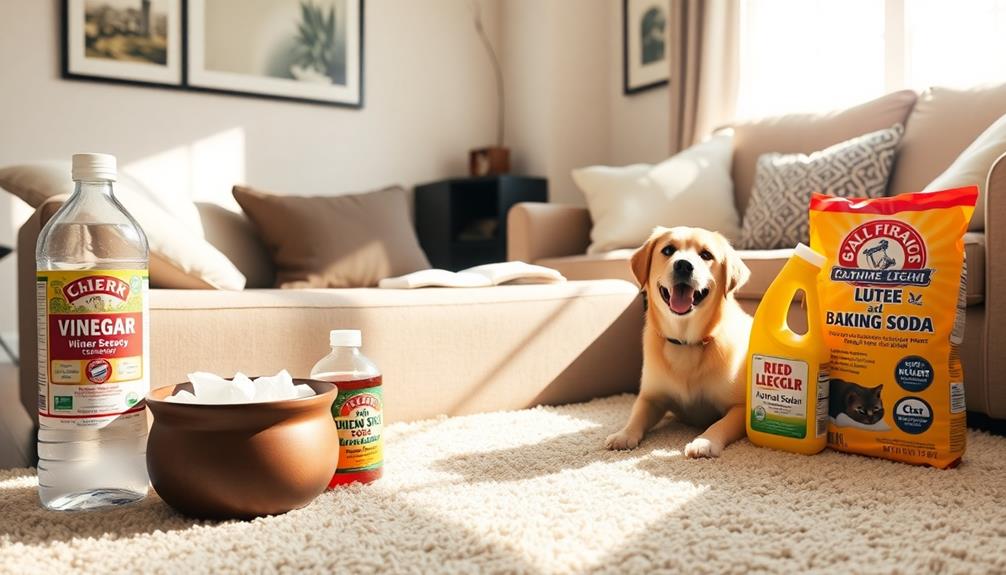
Dealing with dog gland smell on furniture can be a frustrating experience for pet owners, but the community has shared plenty of effective strategies. One popular tip is to use enzymatic cleaners like Nature's Miracle, which break down odors caused by anal glands.
Many users have found success soaking the affected area with a vinegar and water mixture, letting it air dry for odor neutralization.
To prevent odors from accumulating, consider regularly washing slipcovers and using protective blankets on your furniture. This makes cleaning easier and keeps your space fresh.
Some pet owners also recommend using Febreze for odor neutralization. They note that applying it generously can mask and eliminate unpleasant smells effectively.
Community members emphasize the importance of prompt cleaning after any incidents. Immediate attention to signs of anal gland leakage can prevent odors from setting in.
Staying proactive with these cleaning tips not only helps maintain a fresh environment but also guarantees that your furry friend's habits don't negatively impact your home.
Frequently Asked Questions
How to Get Rid of Fishy Smell From Dog at Home?
To get rid of that fishy smell from your dog at home, bathe them regularly with a quality shampoo, increase their fiber intake, and keep the environment clean with pet-friendly wipes and enzymatic cleaners.
Why Does My Dog Express His Glands on the Couch While Sleeping?
Have you noticed your dog expressing his glands while sleeping? It's often due to relaxation or fullness. Certain breeds are more prone to this, but regular vet visits and a proper diet can help manage it.
How Do You Empty a Dog's Scent Gland?
To empty your dog's scent glands, gently apply pressure at the 4 o'clock and 8 o'clock positions around the anus. Always wear gloves and have cloths ready, and consult a vet if unsure.
Conclusion
By understanding the causes of dog gland smells, using the right cleaning supplies, and applying effective techniques, you can reclaim your furniture from unpleasant odors. Staying vigilant for signs of anal gland issues and taking preventive measures will help you maintain a fresh environment. So, act promptly, clean thoroughly, and keep odors at bay. With these strategies in place, you'll foster a healthier home for both you and your furry friend, ensuring comfort and cleanliness for all.
